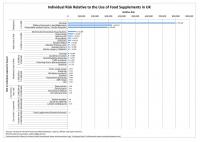All:
FDA struggled for years to get current Good Manufacturing Procedures (cGMP) regulations passed as required under DSHEA, with constant pushback from the industry. Since they were more or less finalized in 2007, there have been reports year after year that more than half of inspected manufacturing facilities have failed: for instance, in 2012, the Chicago Tribune reported that
In the last four years, the U.S. Food and Drug Administration has found violations of manufacturing rules in half of the nearly 450 dietary supplement firms it has inspected, according to agency officials.
The inspection reports portray an industry struggling to meet basic manufacturing standards, from verifying the identity of the ingredients that go into its products to inspecting finished batches of supplements.
Some firms don’t even have recipes, known as master manufacturing records, for their products.
Others make their supplements in unsanitary factories. New Jersey-based Quality Formulation Laboratories produced protein powder mixes and other supplements in a facility infested with rodents, rodent feces and urine, according to government records. FDA inspectors found a rodent apparently cut in half next to a scoop, according to a 2008 inspection report.
“It’s downright scary,” said Daniel Fabricant, head of the FDA’s Division of Dietary Supplement Programs. “At least half of industry is failing on its face.”
The FDA began conducting inspections in 2008 to assess compliance with new regulations governing the manufacturing, packing and holding of dietary supplements. Since then, 1 in 4 dietary supplement companies inspected by the agency have received a warning letter, considered a significant enforcement action.
So far this year, FDA inspectors have found violations of good manufacturing practices during two-thirds of the 204 inspections they have conducted in nearly 200 supplement firms’ facilities, agency officials said. Seventy of these inspections resulted in the agency’s most serious rating.
In 2015, as reported by a dietary supplements trade publication (not some extremist anti-supplement organization),
FDA Still Finds Basic GMP Violations in Supplement Industry
For a number of years, FDA inspectors have continued to observe dietary supplement firms commit the same egregious violations of manufacturing regulations. Unfortunately, fiscal year 2015 was no different.
Nearly 19 percent of dietary supplement firms that were cited by inspectors for violations of the cGMPs (current good manufacturing practices) allegedly failed to set specifications for the identity, purity, strength and composition of the finished product, INSIDER learned through a Freedom of Information Act (FOIA) request. About 16 percent of firms that were issued a document for violations of cGMPs, or 46 total inspections, failed to verify the identity of a dietary ingredient through an appropriate test or exam, according to the FDA data. ...
FY15 cGMP inspections: 483
Reinspections: 63
Form 483s issued [Warning Letters documenting substantial inspection failure]: 281 [That is, [281/(483-63)]= 67% of inspected facilities failed inspection]
Total observations: 1,437
Average number of observations: 5.1
Most common observation: failure to establish product specifications
Dietary supplement facilities registered with FDA: 12,964 [that is, only about a third of facilities inspected at all]
Source: FDA
... and now we know that still, in 2018:
Harvard Medical School professor criticizes FDA drop in dietary supplement inspections
... FDA data shows the agency conducted 591 inspections in fiscal year 2018 (FY18) for compliance with cGMPs (current good manufacturing practices), regulations FDA adopted more than a decade ago. That’s down from 656 inspections the previous year.
Of the total inspections in FY18, 317—or 54 percent—received a document (Form 483) alleging violations of the cGMPs, according to FDA data INSIDER obtained through a Freedom of Information Act request. In the previous year, 379 inspections—or 58 percent—were cited for alleged infractions or “observations,” FDA data shows.
…
Dietary supplement cGMPs: By the numbers
FY18 inspections: 591
Firms issued Form 483: 317
Average number of inspections per 483: 5.12
Most common “observation”: You did not establish product specifications for identity, purity, strength and composition of finished dietary supplement (75 inspections/23.66 percent of inspections issued 483).
Source: FDA based on response to Freedom of Information Act request.
…
“The dietary supplement cGMP regulation has been in effect for about 10 years, and the overall level of industry-wide compliance that we observe during inspections is still well below where it needs to be,” Steven Tave, director of FDA’s Office of Dietary Supplement Programs, said in an emailed statement. “We continue to see fundamental deficiencies, and our compliance and enforcement activity, including recalls, warning letters and judicial actions, reflects that reality. This is a state of affairs that has to improve.”
Nonetheless, Tave recognized “many firms are, for the most part, getting it right.” ...
Corinne Newhart, an FDA spokeswoman, said ... “Generally speaking, dietary supplement firms are inspected every three years or five years, depending on whether they are considered to be high risk,” she explained in an email....
Under FSMA, high-risk facilities must be inspected every three years. But each year, FDA only inspects a fraction of the total number of registered facilities. According to a presentation from an FDA official, there were 9,300 registered dietary supplement facilities in FY17. [So only 6% of facilities were even inspected!].
Potentially complicating matters for FDA, new entrants regularly venture into the dietary supplement market, while others merge or go out of business.
“There’s a lot of new companies,” Marian Boardley, an independent cGMP consultant, said in an interview. “Companies get bought. Companies get sold. They get merged. They go bankrupt.”
Larisa Pavlick is a former FDA investigator who inspected dietary supplement facilities for compliance with cGMPs in the Denver District. She has firsthand experience dealing with the agency’s competing priorities and limited resources.
“Just from a management perspective, when you only have one handful of investigators to apply to the entire food industry, the resources are not being placed in the supplement area, especially when there’s outbreaks,” said Pavlick, vice president of global regulatory and compliance with the United Natural Products Alliance (UNPA). “Everyone gets pulled into whatever the emergency or outbreak is and managing those versus the routine work that might [be devoted to] the supplement GMPs.”
FDA still finding same cGMP deficiencies at dietary supplement facilities
... In fiscal year 2018 (FY18), 75 inspections—or about 24 percent of firms that received a Form 483 inspection report for “observations,” or alleged cGMP violations—were cited for failing to establish product specifications for the identity, purity, strength and composition of the finished dietary supplement, FDA data revealed. This was the most common cGMP observation in FY18 year as well as in FY17 when 24 percent of firms (89 inspections) were cited for the same infraction, according to FDA data INSIDER obtained through the Freedom of Information Act (FOIA).
Over the years, FDA has repeatedly emphasized the importance of setting and following specifications for the identity and other key attributes of a dietary supplement. Without doing so, FDA and outside cGMP consultants have said, manufacturers have no reliable way to know and verify what is in their products.
Nearly half (274 inspections, or 46 percent) of the 591 inspections in FY18 didn’t receive a Form 483, which suggests those dietary supplement manufacturing facilities are fully compliant with the cGMPs. [MR: actually, no, it doesn't: it means that 46% of facilities did not have infractions serious or persistent enough to trigger a Form 483 Warning Letter]. ...
Through the first nine months of 2018, FDA most commonly cited dietary supplement firms in warning letters for failing to establish and follow written procedures for the responsibilities of quality control operations. In FY18 Form 483s, the latter cGMP infraction was the second most cited cGMP observation (52 inspections, representing around 16 percent of all Form 483s).
In the previous three years, the most common cGMP violation reported in FDA warning letters was related to specifications to establish when devising a production and process control system, NPA reported this week in a chart within a news release. The above infraction dropped to the third most-cited cGMP violation in 2018 warning letters, while the second most commonly cited infraction related to recordkeeping requirements for production and process control systems.
Written Procedures and Recordkeeping
Daniel Fabricant, Ph.D., president and CEO of NPA, didn’t seem surprised that many cGMP infractions in 2018 warning letters related to written procedures and recordkeeping. The point of a GMP rule, he said in an interview Wednesday, is to ensure safety and consistency in the manufacturing of products. ...
“We know they’re [FDA investigators] not going to be everywhere,” Fabricant, who previously oversaw FDA’s Division (now an office) of Dietary Supplement Programs, said. “But what’s the number they have to conduct to at least ensure a baseline level of compliance? That’s the question I think that still remains unanswered.”
He asked, “[i]f FDA’s only getting to 5 percent of the firms out there, 10 percent of the firms, is that truly enough to deter bad behavior when it comes to manufacturing quality?”





























































